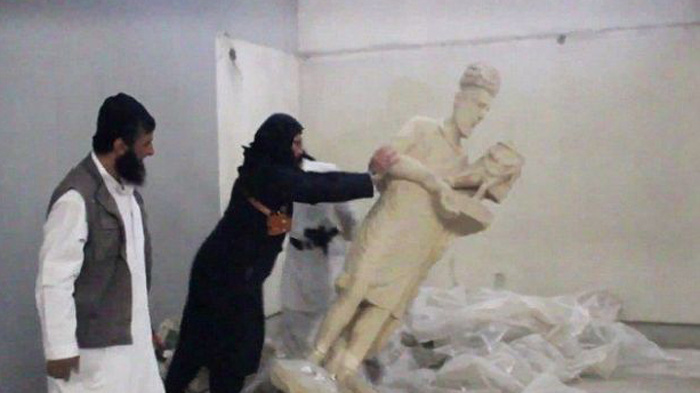Isis fighters destroy ancient artefacts at Mosul museum

Islamic State militants ransacked Mosul’s central museum, destroying priceless artefacts that are thousands of years old, in the group’s latest rampage which threatens to upend millennia of coexistence in the Middle East.
The destruction of statues and artefacts that date from the Assyrian and Akkadian empires, revealed in a video published by Isis on Thursday, drew ire from the international community and condemnation by activists and minorities that have been attacked by the group.
“The birthplace of human civilisation … is being destroyed”, said Kino Gabriel, one of the leaders of the Syriac Military Council – a Christian militia – in a telephone interview with the Guardian from Hassakeh in north-eastern Syria. The destruction took place in Mosul, the Iraqi city that has been under the control of Isis since June when jihadi fighters advanced rapidly across the country’s north.
“In front of something like this, we are speechless,” said Gabriel. “Murder of people and destruction is not enough, so even our civilisation and the culture of our people is being destroyed.”
The five-minute video, which was released by the “press office of the province of Nineveh [the region around Mosul]”, begins with a Qur’anic verse on idol worship. An Isis representative then speaks to the camera, condemning Assyrians and Akkadians as polytheists, justifying the destruction of the artefacts and statues.
The man describes the prophet Muhammad’s destruction of idols in Mecca as an example.
“These statues and idols, these artifacts, if God has ordered its removal, they became worthless to us even if they are worth billions of dollars,” the man said.
Isis militants then smash the statues in the Mosul museum with hammers and push them to the ground, watching them break into tiny fragments. The footage also shows a man dressed in black at a nearby archaeological site, inside Mosul, drilling through and destroying a winged bull, an Assyrian protective deity, that dates back to the 7th century BC
“When you watch the footage, you feel visceral pain and outrage, like you do when you see human beings hurt,” said Mardean Isaac, an Assyrian writer and member of A Demand for Action, an organisation dedicated to protecting the rights of the Assyrians and other minorities in Syria and Iraq.
A caption says the artefacts did not exist in the time of the prophet, and were put on display by “devil worshippers”, a term the militant group has used in the past to describe members of the Yazidi minority.
A professor at the Archaeology College in Mosul confirmed to the Associated Press that the two sites depicted in the video are the city museum and Nirgal Gate, one of several gates to Nineveh, the capital of the Assyrian empire.
“I’m totally shocked,” Amir al-Jumaili told the AP “It’s a catastrophe. With the destruction of these artefacts, we can no longer be proud of Mosul’s civilisation.”
Isis took control of Mosul last summer in a lightning advance that led to the eviction of thousands of Christians and other minorities from their ancestral homelands in the Nineveh plains, amid reports of forced conversions.
“We cannot expect anything else from Daesh,” said Gabriel, using the Arabic acronym for Isis.
He said the international community must act to prevent the destruction and looting of the artifacts.
“The loss is the loss of the entire world,” he said.
Isaac said: “While the Islamic State is ethnically cleansing the contemporary Assyrian populations of Iraq and Syria, they are also conducting a simultaneous war on their ancient history and the right of future generations of all ethnicities and religions to the material memory of their ancestors.”
The destruction of the priceless treasures comes days after Isis kidnapped 220 Assyrian Christian villagers in north-eastern Syria.
It is the latest assault in a campaign against coexistence in the region, especially in Iraq, which has seen the displacement of many of its Chaldean Christians, who have lived there with many ethnic minorities since the religion’s dawn.
Isis has also attempted to starve and enslave members of the Yazidi minority in Iraq.
Irina Bokova, the director general of Unesco, the UN cultural agency, said she was deeply shocked at the footage showing the destruction and has asked the president of the UN security council to convene an emergency meeting “on the protection of Iraq’s cultural heritage as an integral element for the country’s security”.
Source: The Guardian

